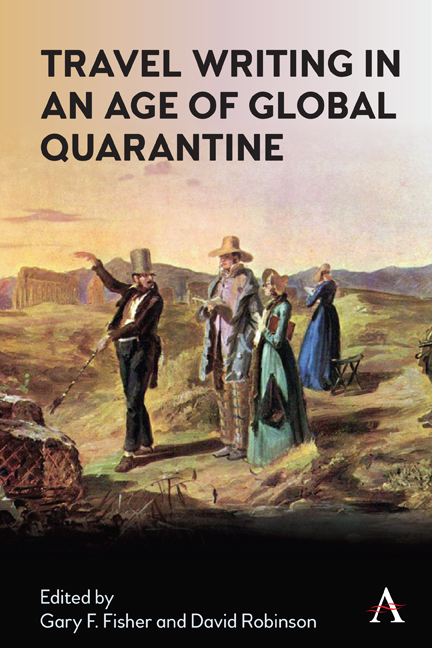Book contents
- Frontmatter
- Contents
- Foreword
- Acknowledgements
- Introduction
- Chapter One ‘Off-Stage, A War’: Wuhan, 1938
- Chapter Two Frederic Lees in Varese Ligure, 1911
- Chapter Three ‘A Rude People Subjected to No Restraint’: In Tanimbar with Anna Keith Forbes, Henry Forbes and So’u Melatunan
- Chapter Four Sent to Coventry: A Journey Home?
- Chapter Five Bedouin Is a Place: Freya Stark’s Travel with Nomads
- Chapter Six With Wilkie in the West: Reading Wilkie Collins’s Rambles beyond Railways from a Cornish Perspective
- Chapter Seven Picturing Rome: Walking the Eternal City with the Last Victorian
- Chapter Eight Su e zo per i ponti; or, How History Does Not Help
- Chapter Nine A Town Called Entropy: Boom and Bust in Arnold Bennett’s Potteries
- Chapter Ten Travelling towards Transculturalism? Statues, Remembrance and Mourning in Bloemfontein, South Africa
- Chapter Eleven Recollections of the King’s House
- Chapter Twelve Occupying Her Time: Ginette Eboué, France, 1940–42
- Epilogue
- List of Contributors
- Works Cited
Chapter Ten - Travelling towards Transculturalism? Statues, Remembrance and Mourning in Bloemfontein, South Africa
Published online by Cambridge University Press: 18 November 2021
- Frontmatter
- Contents
- Foreword
- Acknowledgements
- Introduction
- Chapter One ‘Off-Stage, A War’: Wuhan, 1938
- Chapter Two Frederic Lees in Varese Ligure, 1911
- Chapter Three ‘A Rude People Subjected to No Restraint’: In Tanimbar with Anna Keith Forbes, Henry Forbes and So’u Melatunan
- Chapter Four Sent to Coventry: A Journey Home?
- Chapter Five Bedouin Is a Place: Freya Stark’s Travel with Nomads
- Chapter Six With Wilkie in the West: Reading Wilkie Collins’s Rambles beyond Railways from a Cornish Perspective
- Chapter Seven Picturing Rome: Walking the Eternal City with the Last Victorian
- Chapter Eight Su e zo per i ponti; or, How History Does Not Help
- Chapter Nine A Town Called Entropy: Boom and Bust in Arnold Bennett’s Potteries
- Chapter Ten Travelling towards Transculturalism? Statues, Remembrance and Mourning in Bloemfontein, South Africa
- Chapter Eleven Recollections of the King’s House
- Chapter Twelve Occupying Her Time: Ginette Eboué, France, 1940–42
- Epilogue
- List of Contributors
- Works Cited
Summary
Bloemfontein is a complex place. An American might call it ‘flyover country’ – a space which you pass ‘over’ or ‘through’ on your way from Johannesburg to Cape Town. For those visiting the country on holiday, their time is more likely to be spent looking for the ‘big five’ at Kruger National Park, marvelling at Table Mountain in Cape Town, making the solemn pilgrimage to Robben Island or sipping pinotage in the winelands around Stellenbosch. In short, Bloemfontein is rarely thought of as a destination. As one former resident has put it, ‘The isolation of this rural province from the big cities, the desolation of the endless spread of dry, brown, open veld, the general lack of cosmopolitan entertainment and the rigid conservatism of the place will test your spirit.’ Yet in January 2013 – one-way ticket in hand – I found myself moving there. With my suitcase and a sense of trepidation for company, I was on my way to take up a postdoctoral fellowship at the University of the Free State (UFS) in the newly formed International Studies Group.
Although I’d spent time in Cape Town, Bloemfontein – I was told – was quite a different proposition. If the mood in (White) Cape Town is generally one of confident exceptionalism (try finding anyone who admits to voting for the NP – the political party that instituted and maintained apartheid), then I’d got the sense that the idea of the ‘rainbow nation’ – a metaphor coined by Archbishop Desmond Tutu to promote racial reconciliation in the post-apartheid period – didn't have the same resonance in a city that was feted as the home of Afrikanerdom. After I had accepted the job and was trying to make sense of the unending loop of Kafkaesque bureaucracy that getting a visa entailed, I set about some half-hearted research, attempting to get a sense of the university and city – some 6,000 miles away – that I was moving to. My sofa sleuthing yielded a series of peculiar if not particularly exciting titbits: J. R. R Tolkien, author of The Hobbit and Lord of the Rings, was born in Bloemfontein in 1892; it was where the English football team had been knocked out of the 2010 World Cup; shops were prohibited from selling alcohol on Sunday; and there was a zoo/ big cat park, the ominously titled ‘Cheetah Experience’.
- Type
- Chapter
- Information
- Travel Writing in an Age of Global Quarantine , pp. 135 - 146Publisher: Anthem PressPrint publication year: 2021



